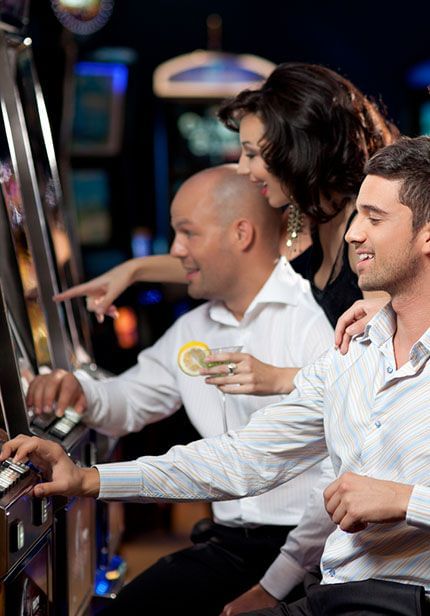How Do Casinos Pay Out Large Sums Of Money?
Let's say, for example, you win $25,000 or less on a slot machine. You will have the option of being paid by cash or check. However, if the win is larger that $25,000, your options change depending upon the casino you are playing at. There are several different ways you can be paid your winnings. The first, of course, is the lump sum payment. Another way is through an annuity, wherein the money you've won is paid out in installments. Winners will be given up to 90 days to decide if they want the lump sum or the annuity. Note that many casinos will pay the entire amount up front.
$5000 or More in Winnings
All winnings specifically from poker tournaments and slot machines - are taxable at the federal level, and some may be taxable at the state level, too. "Since each state has its own set of regulations for gambling taxes, be sure to pay close attention to the local requirements before filing your next tax return. In addition to state tax, the IRS also taxes gambling winnings. For certain games and for larger winnings, winners will need to file IRS Form W2-G. No matter the amount, all winnings must be reported on the next tax return if the earnings exceed these wins."
- $1,200 or more from a slot machine or bingo game
- $1,500 or more in keno winnings
- $5,000 or more in poker tournament winnings
If winnings meet or exceed the above payouts, the casino will withhold up to 25 percent of your winnings in taxes before disbursing the final amount. Winners can expect to receive a W2-G tax form outlining the transaction.
Typically, when it comes to casino winnings of less than $25,000, players can expect to receive their payouts in the form of cash or a check. However, for larger winnings, casinos may offer the choice between a lump sum payment or periodic installments as an annuity. It's important to note that certain casinos may have specific policies in place, leaving gamblers without the option to select their preferred method of payment for their winnings.
How Will I know if I will be paid in a Lump Sum or Have to Opt for Annuity?
The quickest way to determine how winnings are disbursed is to look at the faces of common slot machines. It will clearly disclose whether the machine is an annuity game or an immediate full-pay win. If you are given a choice of payout options, it may be wise to consult with a certified financial planner, tax attorney or certified public accountant to help determine the best decision.
Do I Have to Pay Taxes for a Lump Sum Payment?
Yes. If you opt for a lump sum payment, you will have to pay taxes on your winnings for the current year.
How much money can you win gambling without paying taxes?

You can cash out $600 of overall winnings without paying taxes. You must pay taxes straight away if you win $600+ on one spin or hand. In any case, you'll have to pay taxes on those winnings. But the difference here is that you'll be able to cash out $600 without the casino removing the tax percentage for you. In order to be operating legally, your online casino must conform to regulations. This means that if the IRS comes knocking at their door, they'll be contractually obliged to offer up your records. For online cash games, players are often given their full gross payout. That means they then have to file their own taxes. It's during tournaments that casinos may withhold the percentage owed to the government. Sometimes, online casinos will keep all winnings and players will get an email requesting them to give tax information. This happens when you: Win $600+ in a freeroll tournament or Win $5,000+ in a regular tournament. The online casino will only release winnings once they receive information. You'll sometimes get the choice of letting the site keep the tax percentage, or getting all the winnings and having to file your taxes yourself.
Do casinos give you cash?
You're going to have to pay tax on all of your winnings, and the casino will issue you a W-2G form, a special IRS document designed specifically for "certain gambling winnings." The good news is that if you're a frequent gambler, you can deduct the money you spent while chasing that jackpot-provided, of course, that you kept records of both your wins and your losses.
Can someone else claim my casino winnings?
You will need power of attorney and you will have to fill out a 1099 or equivalent for your winnings. Usually the casino has one of these forms on hand for those cashing out prizes.
How much tax do you pay on casino winnings?
The good thing about gambling the tax law for big winners is that, unlike income taxes, gambling taxes are not progressive. Whether you win $1,500 at the slot machine or $1 million at the poker table, the tax rate you owe on your gambling winnings always remains at 25%. When you win a big slot machine jackpot, the casino is required to withhold the 25% itself when you claim your prize; it also provides you with an IRS form, called a W2-G, to report your winnings to the government.
What happens if I don't report my gambling winnings?
If you're a recreational gambler you must report your winnings as "other income" on the front page of your 1040 form. If you don't report gambling winnings this can draw the attention of the IRS - especially in the event that the casino or other venue reported your winnings on form W-2G. What you should do is deduct your losses only to the extent that you report your gambling winnings. For example, if you were to report you had won $5000 gambling but had losses of $20,000, this could cause a red flag. Also, only professional gamblers can write off the costs of meals, lodging and other expenses related to gambling. And the surest way to invite an audit is by writing off what you lost at gambling but no gambling income.
Do casinos report your winnings to the IRS?
Yes, but there are certain thresholds that must be met to trigger a casino to report winnings. The threshold for which gambling winnings that must be reported to the IRS varies based on the type of game. At a horse track, you must report any winnings that exceed either $600 or 300 times your initial wager. For slot machines and bingo, you are required to report all winnings in excess of $1,200. In a poker tournament, you must report winnings above $5,000.
Can casinos kick you out for winning too much?
Yes. Here is an example: an actor was playing blackjack at a land-based casino in Las Vegas. He was approached by a casino rep who told him, "You're too good at this game." "You're counting cards." Then the casino declined his action, effectively banning him from the blackjack tables. How did this happen? Can it happen to you? The short answer is yes. Counting cards at blackjack is just one example. Roulette, craps, poker-all table games are potential breeding grounds for situations that can prohibit you from future play.
Why do I never win at the casino?
The reason is simple: You never win at gambling because you only stop when you run out of money. If you hang around the casino for hours on end and only leave when you're out of money, you're never going to win. The key to winning money in gambling is to stop when you're ahead. How much money do you have to be ahead before you decide it's time to call it a day? Do you quit if you win your first $5 hand of blackjack. Start it off small and work from there. Begin with a win limit of about 5 units. So if you bet $1 a hand, try a session in which your win limit is $5. Gambling is a form of entertainment and it has a cost associated with it. So don't go in expecting to be a long term winner. You should also set a loss limit. A loss limit won't help winning, but it will help you minimize the damage that comes with gambling too long. Caveat: When I review online slots for high rollers, I always advise players to start small and work their way up.
How much money should I bring to the casino?
If you are a low roller, betting small amounts and playing strictly for fun, I would bring at least $50 cash money. If you want to bet like a high roller and hope to make a big score, I'd bring approximately $200 cash money. If you fall somewhere in between, then anywhere between $50 to $100 cash money would suffice. The bottom line is depending on how long you want to stay at a casino as well as how much you want to bet all depends on how much you can afford to lose.
Can you claim casino losses on your taxes?
You are allowed to deduct any money you lose gambling from your winnings for tax purposes. However, gambling losses in excess of what you win may not be claimed as a tax write-off.
Is gambling winnings counted as earned income?
Lump sum payments are taxed as ordinary income, though you only have to pay them one time. On the other hand, receiving casino winnings as a structured settlement provides a controlled income stream over a longer period. Payments are not taxed until they are disbursed, allowing for interest to accrue over time. However, this payout option limits the amount of cash a winner receives at one time, especially if additional funds are needed for financial emergencies.
What happens when you win a jackpot at a casino?
Casinos have various ways of paying winners. Generally, if the winnings are $25,000 or less, winners can choose between cash or check. If the winnings are larger, the options may change depending on the location of the casino and the game gambled upon. Some games allow for a lump sum disbursement, where the money is paid up front. Other games disburse winnings through an annuity, where the money is paid in installments. Often, winners have up to 90 days to decide whether they want a lump sum or annuity, though in some cases they are not given a disbursement option, and only a lump sum is offered. No matter the amount, all winnings must be reported on the next tax return if the earnings meet certain thresholds. $600 or more from a slot machine is the new threshold. It should be noted here that the threshold for winnings on slots used to be $1200. It was subsequently lowered to $600.
What happens if you win millions at a casino
If you win millions of dollars at a casino, it can be a life-changing event. You will likely need to claim your winnings in person at the casino, and the amount of time it takes to receive your money will depend on the casino's policies and the amount you have won. It is important to note that casinos are required to report winnings over a certain amount to the Internal Revenue Service (IRS), and you will be responsible for paying taxes on your winnings. It is a good idea to consult with a financial advisor or accountant to ensure that you handle your windfall in a responsible and financially-sound manner.
Note: The information provided above is from multiple sources in order to ensure that each question is answered truthfully.


